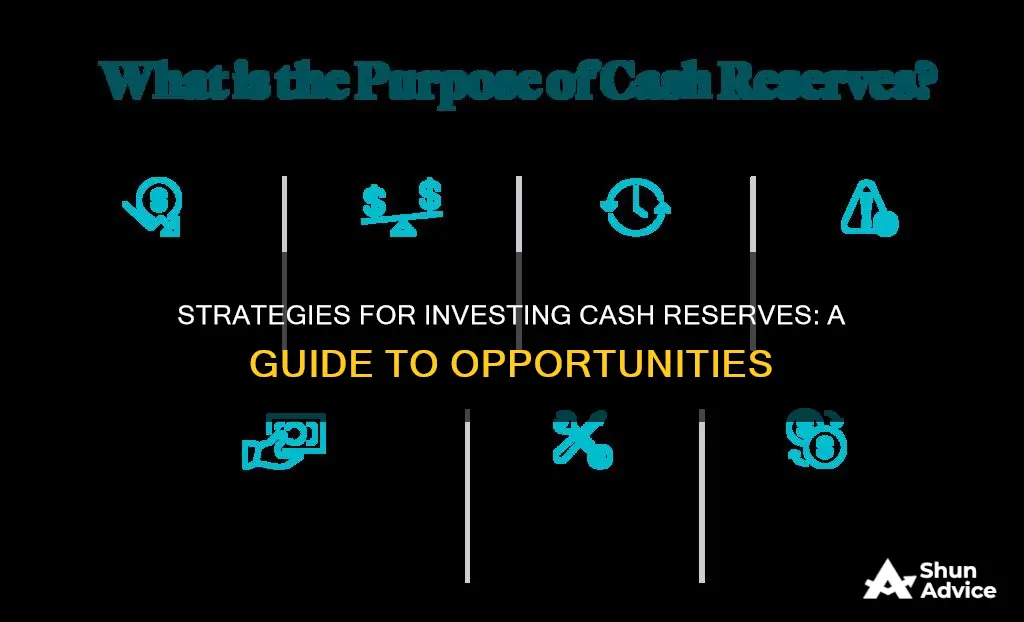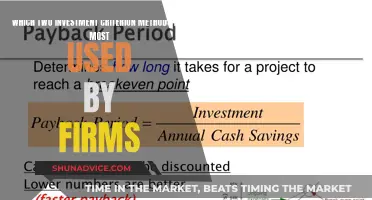
Investing cash reserves is an important topic for both individuals and businesses. While holding cash reserves is essential for covering unexpected expenses and saving for the future, it's also crucial to ensure that these funds are utilised efficiently to maximise returns and avoid the negative effects of inflation. For individuals, financial advisors often recommend setting aside three to six months' worth of essential expenses as an emergency fund, which can be kept in high-yield savings accounts or money market accounts. For businesses, cash reserves are vital for covering short-term expenses, such as payroll and vendor payments, and there are various investment options available, including government securities, commercial paper, and cash management funds, each offering different levels of liquidity, safety, and yield.
| Characteristics | Values |
|---|---|
| Liquidity | High |
| Accessibility | Quick and Easy |
| Risk | Low |
| Returns | Low |
| Safety | High |
| Investment Options | Money Market Funds, Bank Deposit Accounts, Short-term Government Securities, Commercial Paper, Cash Management Funds, Treasury Inflation-Protected Securities, Mutual Funds, Stocks, Bonds |
What You'll Learn

Short-term government securities
Treasury bills (or T-bills) are short-term US government debt obligations with a maturity of one year or less, backed by the US Department of the Treasury. T-bills are usually sold in denominations of $100, but some can reach a maximum denomination of $5 million in non-competitive bids. They are issued at a discount from the par value, or face value, and when the bill matures, the investor is paid the face value. So, if the face value is $1000, the bill might be sold for less than that, but it will mature to the full $1000. The difference between the purchase price and the maturity value is the interest earned by the investor. T-bills can be bought directly from TreasuryDirect, the platform of the US Treasury, or via a brokerage firm, although the latter may charge a small fee.
Treasury notes (or T-notes) are intermediate-term bonds with maturities of two, three, five, or ten years that provide fixed coupon returns. T-notes typically have a $1000 face value, except for two- or three-year maturities, which have a $5000 face value.
Treasury securities are available to investors through their broker, bank, or the TreasuryDirect website.
Unlocking Cash Flow Secrets for Smart Investments
You may want to see also

Money market funds
- U.S. Treasuries: Interest-paying debt securities issued by the U.S. government.
- Municipal securities (munis): Interest-paying securities issued by municipal and state governments to finance various operations.
- Certificates of deposit (CDs): Promissory notes issued by banks that pay a fixed amount of interest in exchange for depositing cash for a specified time.
- Commercial paper: Short-term debt or promissory notes issued by companies to meet immediate liabilities, typically with maturities of no more than 270 days.
- Repurchase agreements (repos): Short-term debt agreements where a dealer sells government securities to an investor as collateral for cash and agrees to repurchase them at an agreed-upon price, typically the following day.
- Bankers' acceptances: A promised future payment, similar to a post-dated check, issued and guaranteed by a bank.
- Government money market funds: These funds invest in government securities, such as U.S. Treasuries, and collateralized repos involving Treasuries. They may also include securities from government-sponsored enterprises (GSEs) like Fannie Mae, Freddie Mac, and the Federal Home Loan Banks. However, GSE debt is generally not guaranteed by the U.S. government.
- Municipal money market funds (tax-exempt funds): These funds invest in municipal securities, and interest on these securities is typically exempt from federal income tax.
- Prime money market funds (general-purpose money markets): These funds can invest in any of the security types mentioned above and are not limited to government securities.
- Steady interest income with low risk.
- High liquidity, allowing easy access to funds.
- Diversification by pooling assets from multiple investors and investing in a wide array of securities.
- Tax advantages, as some funds invest in municipal securities that are tax-exempt at the federal and sometimes state level.
- Relatively low cost, with no withdrawal fees, although some companies may charge a small annual fee or a fee for investments below a minimum threshold.
However, there are also disadvantages to consider:
- Money market funds are not FDIC-insured and are not guaranteed by the U.S. government or a government agency. It is possible to lose money by investing in these funds.
- The yield may not keep up with the rate of inflation, leading to potential erosion of gains during periods of high inflation.
- The growth potential is lower compared to stocks and other higher-risk investment products.
- They may impose a fee upon the sale of shares or temporarily suspend the ability to sell shares if the fund's liquidity falls below the required minimums.
Investing Cash: Strategies for Smart Money Allocation
You may want to see also

High-yield savings accounts
Here's what you need to consider when opening a high-yield savings account:
Annual Percentage Yield (APY)
The APY is the key metric when comparing high-yield savings accounts. It indicates how much interest you'll earn in one year, taking compounding into account. The higher the APY, the more you'll earn on your money. Currently, competitive high-yield savings accounts offer APYs of 4-5% or more.
Fees
Some banks charge monthly fees on their savings accounts. These fees can often be avoided by meeting certain requirements, such as maintaining a minimum balance or making regular deposits. It's best to look for an account with no monthly fees, but if you have to choose an account with fees, make sure you can easily meet the waiver requirements. Other fees to watch out for include early account closure fees, excessive transaction fees, and insufficient funds fees.
Minimum Deposit and Balance Requirements
Some banks require a minimum deposit to open a high-yield savings account, which can range from $25 to $100 or more. Additionally, some accounts may require you to maintain a minimum balance to avoid fees or earn the highest APY.
FDIC Insurance
When choosing a bank or credit union, ensure that your deposits are insured by the Federal Deposit Insurance Corporation (FDIC) or the National Credit Union Administration (NCUA). This insurance protects your deposits up to $250,000 per depositor, per bank, per ownership category, in case the bank fails.
Personal Preferences
Consider whether you prefer a bank with physical branches or if an online-only bank suits your needs. Also, evaluate the bank's digital experience, app ratings, and customer service.
Computing Investment Cash Flows: A Guide to Statement Analysis
You may want to see also

Commercial paper
One of the main advantages of commercial paper is that it does not need to be registered with the Securities and Exchange Commission (SEC) if it matures in no more than nine months or 270 days. This makes it a cost-effective and simple means of financing for companies with high credit ratings. Commercial paper also offers lower interest rates for issuers and a low risk of default for investors.
However, one of the risks of commercial paper is that it is unsecured debt. If the issuing company goes bankrupt, investors may not be repaid. Additionally, commercial paper may be less liquid than other investments, as it matures rapidly and there is a small secondary market.
Overall, commercial paper can be a good investment option for cash reserves, particularly for institutional investors, as it provides a way to generate revenue while taking on minimal risk.
Cashing in on Treasury Investment Growth: Receipt Redemption Guide
You may want to see also

Mutual funds
Money market funds are a good option for investors who want to park their cash in a safe, liquid investment vehicle while they decide on other investments or to fund short-term needs. These funds typically hold secure, short-term investments that provide stable value and better yields than a company or individual could get on their own.
Money market funds work like a typical mutual fund. They issue redeemable units or shares to investors and follow guidelines set by financial regulators. Shareholders can usually withdraw their money at any time but may have limits on the number of withdrawals within a certain period. The funds invest in various debt-based financial instruments, including bankers' acceptances, certificates of deposit, commercial paper, repurchase agreements, and U.S. Treasuries.
It is important to note that money market funds are not the same as money market accounts. Money market funds are investment products without FDIC insurance, and their principal value can fluctuate. In contrast, money market accounts are a type of savings account offered by financial institutions with FDIC insurance and higher interest rates than regular savings accounts.
When investing in money market funds, investors should be aware of the potential impact of interest rate fluctuations on their returns. Additionally, while money market funds are considered low-risk, there is still a chance of losing money, and the fund may impose a fee upon the sale of shares.
How Cashing Investments Affect Debt Service Coverage
You may want to see also
Frequently asked questions
Investing cash reserves can help your savings grow faster, allowing you to build an emergency fund and save for short-term goals like a vacation or a down payment on a house.
Some low-risk investment options include money market funds, treasury inflation-protected securities (TIPS), and certificates of deposit (CDs). These options offer high liquidity and low risk, but may provide lower returns.
The general rule of thumb is to keep cash reserves equal to 3-6 months' worth of expenses. However, this may vary depending on your unique circumstances, such as the variability of expenses and revenue.
For long-term investment options, you can consider mutual funds, stocks, or acquiring another business. These options may provide higher returns but come with higher risk.
It's important to consider your financial goals, risk tolerance, and time horizon. Diversifying your investments can also help balance risk and return. Consulting a financial advisor can help you find the right mix of investments for your needs.







